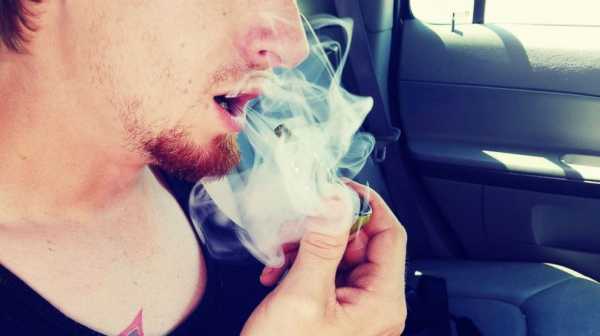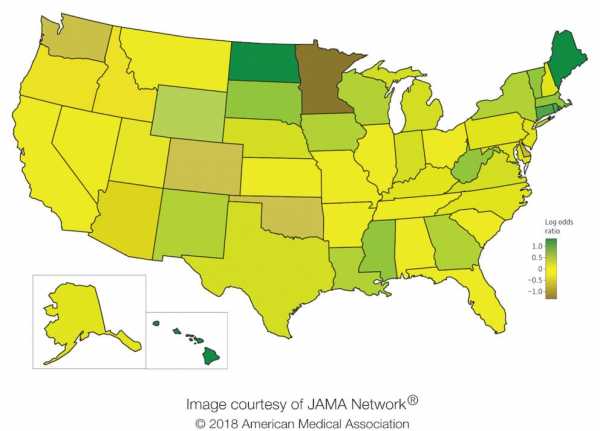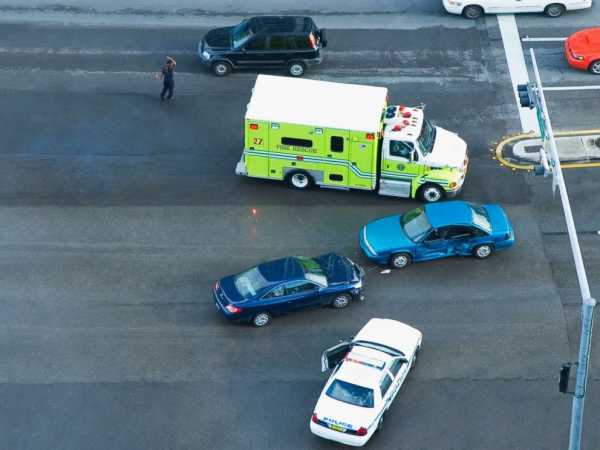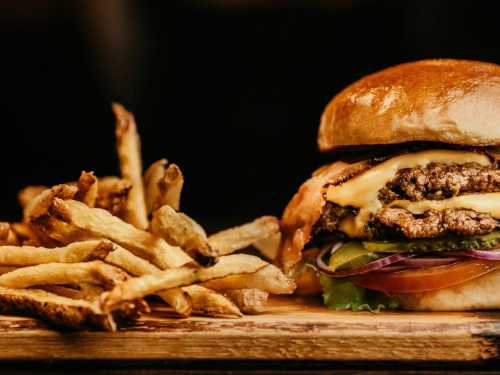
A research letter published in the Journal of the American Medical Association found a 12 percent relative increase in fatal crashes on April 20.
“Twelve percent may not sound like much, but if you consider that a small proportion of Americans celebrate 4/20,” the study’s author Dr. John Staples said, “it suggests that participation in 4/20 is fairly risky.”

The Journal of the American Medical AssociationColors on this United States map represent relative risk of fatal traffic crashes on April 20 compared with control days 1 week earlier and later.
He described the motivation for the research.
“I’m a doctor and I work at a hospital near where a 4/20 festival is held,” the clinical assistant professor of medicine at University of British Columbia said. “Every year, we brace ourselves for a potential surge of patient volume related to the festival. This was a great natural experiment for which we could look at the effects of the festival.”
Researchers are also looking at the effects of marijuana, as several states are considering marijuana legalization in 2018 and 61 percent of Americans support marijuana legalization, according to the Pew Research Center.
Drivers appear to be using marijuana more, as well, according to the 2013-2014 National Roadside Survey of Alcohol and Drug Use by Drivers.
In the survey, samples of blood and saliva were taken from randomly selected drivers during weekend nights. They were tested for THC, a psychoactive compound in cannabis. In the 2007 survey, 8.6 percent of drivers tested positive for THC. In the 2013-2014 survey, 12.6 percent of drivers tested positive for THC — a 46.5 percent increase.

STOCK/Getty ImagesA car accident is pictured in an undated stock photo.
Holidays are often associated with higher rates of car crashes. A 2003 research letter to the New England Journal of Medicine looked at 27 Super Bowls and found a 41 percent relative increase in fatal crashes after the telecast. A 1991 CDC report showed a 64 percent relative increase in fatal crashes on New Year’s Day, in a review of 10 years of research.
And the 4/20 holiday is specifically connected to marijuana use. For either reason, experts say it may be wise to drive more carefully on April 20, especially for younger drivers.
“When we focused on a subgroup of drivers younger than 21 years old, they had a 38 percent higher risk on April 20,” Staples said. “This maps onto what we know of younger drivers being more vulnerable because of less experience and more risk taking behavior.”
The study looked at the connection between fatal crashes and the holiday 4/20, which is a modern invention that many say was popularized in a High Times article published in 1991.
Starting in 1992, researchers looked at 25 years of data from the United States National Highway Traffic Safety Administration. They focused on fatal crashes where at least one person died within 30 days of the crash. Then, they compared the time between 4:20p and 11:59p on April 20 of each year to “control days” one week earlier and one week later.
What they found was the 12 percent increase in fatal crashes during the time period.
However, the research does have some limitations. The results do not prove that cannabis is the culprit behind the bump in fatal crashes on April 20.
Staples suggests several other possibilities — participants may be ingesting other drugs or failing to wear their seatbelts, police may be emphasizing drug enforcement over traffic enforcement, and the festival could interrupt usual traffic flows, among other possibilities.
While there is a strong relationship between blood alcohol levels and impairment, the same may not be true for most psychoactive drugs, cautioned authors of the 2013-2014 National Roadside Survey.
“At the current time, specific drug concentration levels cannot be reliably equated with a specific degree of driver impairment,” the authors said.
This new study provides some insight into the potential hazards of marijuana use on the 4/20 holiday for drivers, but the study authors say any drug use while driving is a concern.
“My main message to the public is that impairment with alcohol or other drugs increases the risk of crash. My main piece of advice is, ‘Don’t drive high,’” Staples said. “4/20 event organizers [need to offer] safer transportation as part of the festival plan in order to help attendees to get home alive. Doctors need to talk to talk to patients about impaired driving in clinical conversations. We need better traffic policies to eliminate impaired driving and reduce death and injuries.”
Sourse: abcnews.go.com






